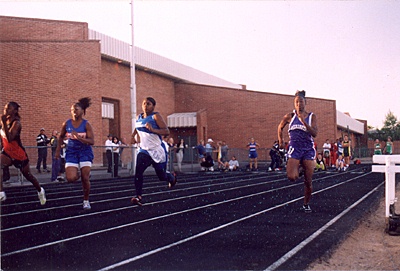All Nonfiction
- Bullying
- Books
- Academic
- Author Interviews
- Celebrity interviews
- College Articles
- College Essays
- Educator of the Year
- Heroes
- Interviews
- Memoir
- Personal Experience
- Sports
- Travel & Culture
All Opinions
- Bullying
- Current Events / Politics
- Discrimination
- Drugs / Alcohol / Smoking
- Entertainment / Celebrities
- Environment
- Love / Relationships
- Movies / Music / TV
- Pop Culture / Trends
- School / College
- Social Issues / Civics
- Spirituality / Religion
- Sports / Hobbies
All Hot Topics
- Bullying
- Community Service
- Environment
- Health
- Letters to the Editor
- Pride & Prejudice
- What Matters
- Back
Summer Guide
- Program Links
- Program Reviews
- Back
College Guide
- College Links
- College Reviews
- College Essays
- College Articles
- Back
America's Favorite Game
We sat in the restaurant, eagerly awaiting the results. For months, we had supported our team through every challenge and hindrance. Every time our team scored, we cried out, cheering and clapping as if it would help win the game. When our team's victory was proclaimed, we ecstatically jolted from our seats with camaraderie, blazing with the energy of our team winning the Superbowl of the century. A grand sports game, however, was not the huge event of the night. We, the Essex County Campaign Team for President Barack Obama, had been watching the presidential election as if it were an exuberating sports event.
The night before, I watched an NFL game with a couple friends who enjoyed watching professional sports. I had never been particularly fond or knowledgeable of professional sports leagues and always seemed out of place when conversing about them. "Kobe has nothing on Lebron." "Philip Rivers killed the Chiefs last night." I would not be able to confidently say Kobe or Lebron is better, nor could I comment on the results of the latest football game. However, while watching the Philadelphia Eagles vs. New Orleans Saints game that night, I understood and respected the affinity that my friends had for professional sports.
Beyond the fundamental entertainment of spectator sports, there is a profound attachment of pride to one's favored team, a competitive ego that rewards victory with an unexplainable fulfillment. Yes, sports are fun. They can even be fun to a degree that one's life revolves around a particular team or sports league. This is especially true for spectators when a sports team represents a greater entity, like a university or region. The feeling of pride runs deeper in these cases; when the spectator roots for his or her team, he/she in turn cheers for a college/state as if it were playing the game instead of the individuals on the field. Many college alumni travel back to their alma maters regularly to attend sporting events. In Spain, a soccer match between FC Barcelona and Real Madrid also functions as a political battle, for Catalan (the region of Spain in which Barcelona is located) desires governmental independence from Spain. These same sentiments can be found in the pastime of American politics.
Sports fans and political spectators have striking similarities when watching an important program on television: aggressive yet poignant cheering; critical discussion and analysis about the "players"; attire endorsing their preferred side; and occasional tears (both joyful and melancholic). Furthermore, like in a sports match between teams of two rival cities, regional differences can heighten the passion of campaigners in a political race. Surely, in this past presidential election, some northeastern liberals were motivated by the wish to beat southern conservatism with progressivism, whereas many right wingers of the south wanted to maintain traditional Southern values in the nation. Ideological dichotomies like these can often turn tragic- American presidents have a notable history of assassinations. Surprisingly, though, there have also been numerous similar attempts at athletes who have not played well in a game. After Red Sox first baseman Bill Buckner made a fielding error in the 1986 World Series, he began to receive several death threats. In similar cases, angry fans have organized and conspired to legitimately murder players who have accidentally thrown a game.
So what is the paramount difference between watching sports and politics? Why do some people bash sports while others refuse interest in civics? I have found that the same intensity and emotions can be found in both pursuits, but politics have such a more significant impact on society. Additionally, participating in them can be extremely rewarding. Winning a sports game is wonderful for the short term, but politics can reform the future for the long term. The stakes of victory are higher. Gratification and love are byproducts of both events; albeit, politics deal with crucial issues that can actually affect the world we live in. Take the energy one would usually put into a sports game and apply it to politics- a worthwhile experience awaits.

Similar Articles
JOIN THE DISCUSSION
This article has 0 comments.